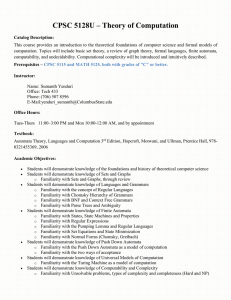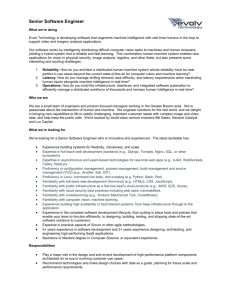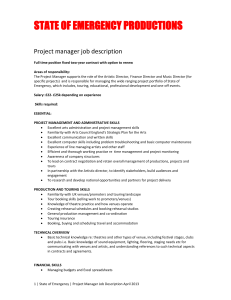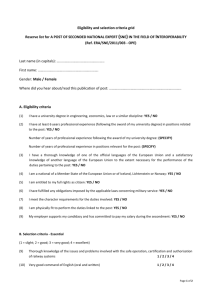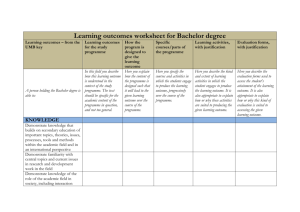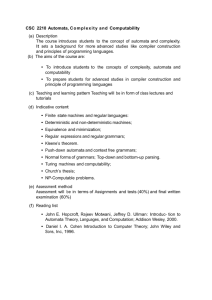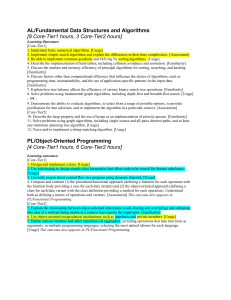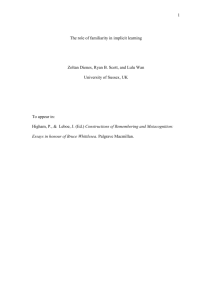CPSC 5128G- Yenduri - Columbus State University
advertisement
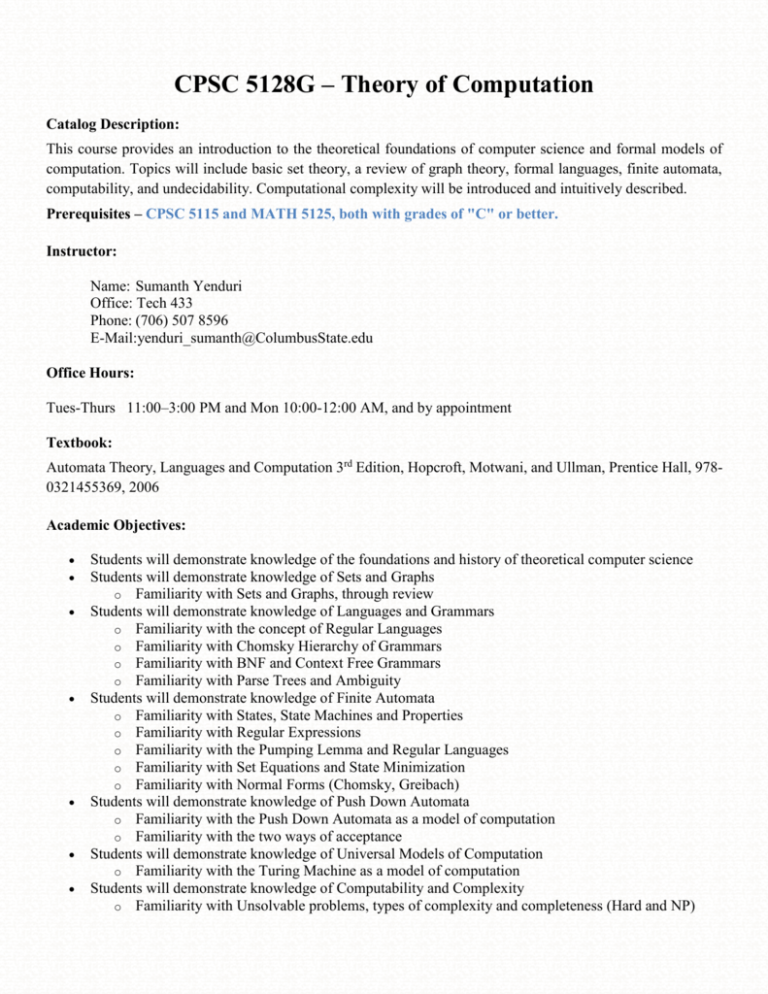
CPSC 5128G – Theory of Computation Catalog Description: This course provides an introduction to the theoretical foundations of computer science and formal models of computation. Topics will include basic set theory, a review of graph theory, formal languages, finite automata, computability, and undecidability. Computational complexity will be introduced and intuitively described. Prerequisites – CPSC 5115 and MATH 5125, both with grades of "C" or better. Instructor: Name: Sumanth Yenduri Office: Tech 433 Phone: (706) 507 8596 E-Mail:yenduri_sumanth@ColumbusState.edu Office Hours: Tues-Thurs 11:00–3:00 PM and Mon 10:00-12:00 AM, and by appointment Textbook: Automata Theory, Languages and Computation 3rd Edition, Hopcroft, Motwani, and Ullman, Prentice Hall, 9780321455369, 2006 Academic Objectives: Students will demonstrate knowledge of the foundations and history of theoretical computer science Students will demonstrate knowledge of Sets and Graphs o Familiarity with Sets and Graphs, through review Students will demonstrate knowledge of Languages and Grammars o Familiarity with the concept of Regular Languages o Familiarity with Chomsky Hierarchy of Grammars o Familiarity with BNF and Context Free Grammars o Familiarity with Parse Trees and Ambiguity Students will demonstrate knowledge of Finite Automata o Familiarity with States, State Machines and Properties o Familiarity with Regular Expressions o Familiarity with the Pumping Lemma and Regular Languages o Familiarity with Set Equations and State Minimization o Familiarity with Normal Forms (Chomsky, Greibach) Students will demonstrate knowledge of Push Down Automata o Familiarity with the Push Down Automata as a model of computation o Familiarity with the two ways of acceptance Students will demonstrate knowledge of Universal Models of Computation o Familiarity with the Turing Machine as a model of computation Students will demonstrate knowledge of Computability and Complexity o Familiarity with Unsolvable problems, types of complexity and completeness (Hard and NP) Course Access: This course is being offered through CougarView (the Desire 2 Learn system). You can access CougarView from the Columbus State University Homepage. Grading Procedures: Exams (2) Final Paper 25% * 2 = 50% 25% 25% A grade B grade C grade F grade Graduate >= 90% 89%-80% 79%-70% <=69% Attendance: Students are expected to attend all classes. You are responsible for all class work missed, regardless of the reason for the absence(s). Paper A 5 page paper needs to be written and submitted by the end of the semester. A recent journal/conference paper needs to be critiqued as part of the 5 pages. The paper that is selected must be approved by ME before March 1st. Any paper related to the course content may be chosen. The point of this exercise is to thoroughly understand the paper, point out its limitations/scope and suggest ways to improve upon the work. Plagiarism or cheating of any type will not be tolerated: This includes, but is not limited to, copying programs, projects, assignments, abstracts, documentation, turning in previously submitted work (in whole or part), using other person's computer accounts etc. Copying from the internet of any type is not allowed. Logical solution to problems may be discussed, but not code of any type. If you are caught, the first time you will receive 0 points and for the second offense you will receive a grade of "F" in the course. Please be aware to logoff or lock your computers (if you step away) while using public access labs so that nobody may take advantage of your work. Also shred all unnecessary printouts while working on an assignment. Missing Exams: If you should miss an exam, you must let me know why you will be missing the exam before the exam is administered to the class (at least a couple of days before). You may send me an e-mail. ONLY WITH MY ACCEPTANCE YOU CAN MISS AN EXAM. It is your responsibility to make it to class on time for all scheduled examinations. If you are late for an examination, you will be allowed only for the remainder of the scheduled period. 2|Page Turning In Work: Pop up quizzes can not be made up. Assignments not turned on time will not receive full credit. All assignments are due the beginning of the class unless I state differently. Again if you have emailed me your assignment, I would go by the time I received the email. I am not responsible for lost email. Note: Please do not delete anything from your accounts or PCs until you have received your final grade on the assignment and accepted it. Always maintain a backup of your work. Refer to the CSU Catalog (http://academics.columbusstate.edu/catalogs/current/acaregs_grad.php#attendance) for more information on class attendance and withdrawal. Test Regrading Policy: I will be glad to review any test for possible grading errors. If any grading errors have been made, your points will be cheerfully refunded. Any requests for regrading of tests must be made within one calendar week upon the return of the test to the class, regardless of when you received your test back. If you submit your test for regrading, I reserve the right to regrade your entire test. Assignments (not tests) such as projects, programs, etc. can not be resubmitted for regrading unless the entire class is afforded this privilege. Disability Act: "If you have a documented disability as described by the Americans with Disabilities Act (ADA) and the Rehabilitation Act of 1973, Section 504, you may be eligible to receive accommodations to assist in programmatic and/or physical accessibility. We recommend that you contact the Office of Disability Services located in Schuster Student Success Center, room 221, 706-507-8755 as soon as possible. The Office of Disability Services can assist you in formulating a reasonable accommodation plan and in providing support. Course requirements will not be waived but accommodations may be able to assist you to meet the requirements. Technical support may also be available to meet your specific need." 3|Page
